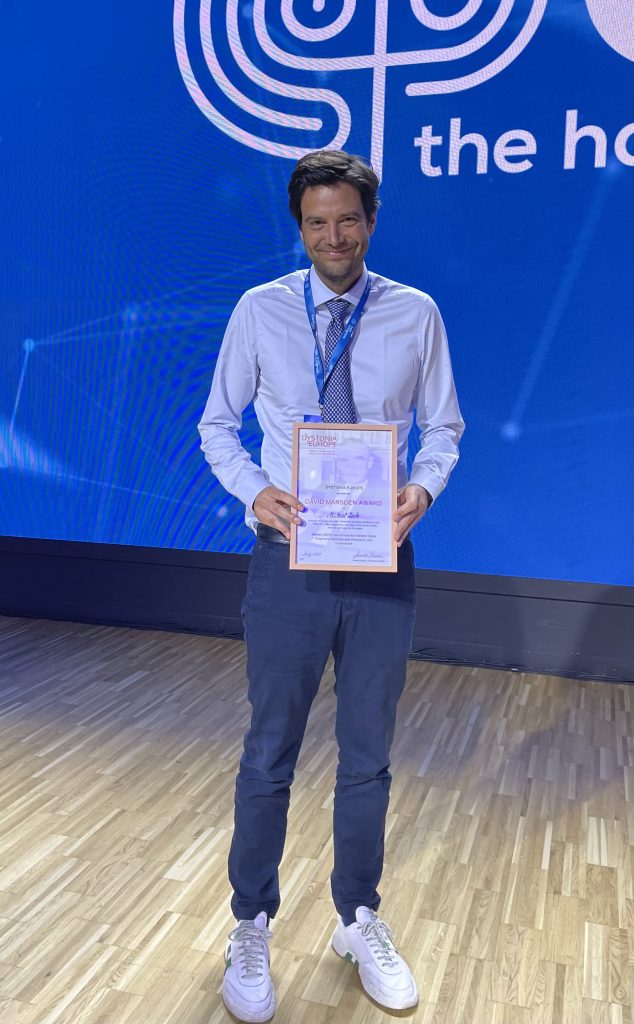David Marsden Award 2023
The award was introduced by Dystonia Europe in 2003 and was presented every two years to stimulate research on dystonia, especially by young scientists in Europe. From 2022, the award is presented every year.
Professor David Marsden (1938 – 1998) was one of the leading neurologists in Europe and DE wishes to honor the enormous part he played in developing knowledge of and interest in dystonia.

The David Marsden Award 2023 was awarded to Dr. Michael Zech for his paper:
Biallelic AOPEP Loss-of-Function Variants Cause Progressive Dystonia with Prominent Limb Involvement
Last July Dr. Zech was presented with the award by Dystonia Europe Executive Director Monika Benson at the Basal Ganglia Session at the 9th EAN (European Academy of Neurology) Congress in Budapest, Hungary. Dr Zech expressed his thanks to Dystonia Europe for the award and then presented the work of his research.
About the winner:
Dr Zech completed his studies in Medicine at the Technical University of Munich, Germany, following internships at the University of Zurich, Switzerland, and Cornell University New York, USA. Dr Zech is a board-certified neurologist and received research fellowships to investigate the genetic underpinnings of neurological disorders at Helmholtz Center Munich, Germany. His work focusses on the genetics of movement disorders, especially dystonia. He was a guest researcher at the Department of Neurology and Neurological Sciences of Stanford University School of Medicine, USA, and has obtained a specialization in Human Genetics.
About the research:
The awarded paper reports the discovery of a new hereditary form of dystonia. Despite successes in the identification of dystonia-causal gene defects in recent years, one of the great challenges in dystonia research is to understand the full spectrum of genetic causes for the disease. Still, more than 90% of affected persons with isolated dystonia remain undiagnosed after maximal genetic investigation. By worldwide collaboration, Zech and colleagues found that mutations in a gene named AOPEP represent a comparatively frequent cause of recessively inherited isolated dystonia in different populations.
AOPEP-related dystonia is characterized by focal, multifocal, or generalized distribution of symptoms, and shows a wide range of onset ages (childhood to late adulthood). The discovery opens news avenues into the study of underlying molecular determinants of dystonia, potentially advancing a better understanding of converging disease pathways
Moreover, the finding helped to provide improved accurate diagnoses to affected patients and families, with implications for counseling and clinical management. The study highlights that international collaborative efforts in the field are essential to promote gene discovery and more efficient research for dystonia.
General Information
- The David Marsden Award is presented every year.
- The Award sum is € 10,000 for papers (i.e. manuscripts for original publication – no abstracts) on aetiology, pathogenesis, diagnosis or therapies in dystonia or on the psycho-‐social effects.
- Applicants should be under 45 years of age.
- Submitted papers may have been published within the last two years.
- Unsuccessful applicants may re-‐present their papers in the following year, if fundamental new scientific findings are involved.
- The applicant should be the first author.
- The research must have taken place within Geographical Europe.
Procedure
- Papers should be submitted by email to the DE Secretariat with a short Curriculum Vitae and a declaration that the paper has not been submitted for any other scientific awards.
- The deadline for submissions is 28 February 2024.
- The evaluation of papers will be carried out by the Dystonia Europe Medical and Scientific Advisory Board and a recommendation made to the DE Managing Board.
- The winner will be invited to make a presentation at the Basal Ganglia Club Session at the EAN Congress 2024 in Helsinki in Finland.
Applications for the DMA 2024 is open from 1 September 2023 through our DMA website
Past Awardees
- David Marsden Award 2022 was awarded to Dr. Susanne Knorr
- David Marsden Award 2021 was awarded to Dr. Martin Reich
- David Marsden Award 2019 was awarded to Dr. Anne Weissbach
- David Marsden Award 2017 was awarded to Dr. Niccolò Mencacci
- David Marsden Award 2015 was awarded to Dr. Cathérine C S Delnooz
- David Marsden Award 2013 was awarded to Dr. Katja Lohmann
- David Marsden Award 2011 was awarded to Dr David Bradley
- David Marsden Award 2009 was awarded to Dr. Ana Djarmati and Dr. Susanne A. Schneider
- David Marsden Award 2007 was awarded to Dr. Mirta Fiorio
- David Marsden Award 2005 was awarded to Dr. Victor Candia
- David Marsden Award 2003 was awarded to Dr. Mark Edwards
